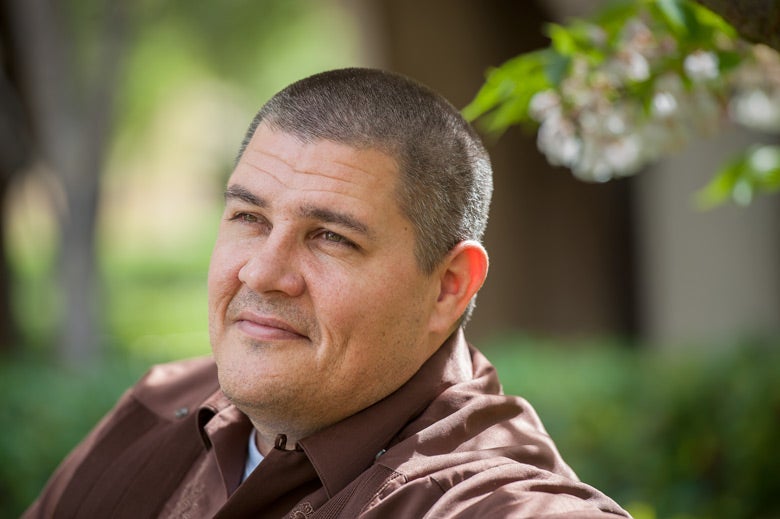
English Professor Adam Johnson won the 2015 National Book Award for fiction for Fortune Smiles, a collection of short stories confronting themes of imprisonment, illness and loss, technological surveillance, and the struggle of sympathizing with the morally abhorrent. (Image credit: L.A. Cicero)
Adam Johnson, a professor of English at Stanford and Pulitzer Prize-winning author, has received the 2015 National Book Award for fiction for his short story collection, Fortune Smiles.
Winners of the award, which recognizes the best American literature, were announced on Wednesday at the 66th National Book Awards Benefit in New York City. The award, which is given in the categories of fiction, nonfiction, poetry and young people’s literature, comes with a $10,000 prize and a bronze statue. Flannery O’Connor, William Faulkner and Ralph Ellison are among the many critically acclaimed writers who have won the award.
Dark and anxious, yet witty and at times surprisingly humorous, Johnson’s six novella-length stories confront themes of imprisonment, illness and loss, technological surveillance, and the struggle of sympathizing with the morally abhorrent. The stories are set in locations across the globe, from Louisiana to Palo Alto, and from Germany to South and to North Korea, where Johnson took his readers in his novel The Orphan Master’s Son, which won the Pulitzer Prize in 2013.
Johnson has said what he likes about the short story form is the discovery, the struggle, the battle and the sense of accomplishment that comes from completing a story.
The collection’s first story, “Nirvana,” has already received acclaim in its own right, winning The Sunday Times EFG Short Story Award in 2014. In it, a computer programmer speaks to the hologram of the recently deceased U.S. president while his wife, who is suffering a horrible illness, listens to Nirvana records. The futuristic story explores the ways we confront great personal loss and the role technology increasingly plays in our relationships with those we love.
Among the collection’s more morally complex stories is “Dark Meadow,” about a pedophile struggling to overcome his urges. Again, the theme of technology arises, as the man (whose screen name is Dark Meadow) uses computers to expose other pedophiles to the police.
Johnson’s extensive knowledge of North Korea, which he researched for years for The Orphan Master’s Son, shows up in the collection’s title story. In “Fortune Smiles,” two North Korean defectors confront culture shock in their new home in Seoul, South Korea.
At Stanford, Johnson, the Phil and Penny Knight Professor of Creative Writing, teaches courses in fiction and creative nonfiction. In one course he teaches, Stories Everywhere, students investigate how “moral, cognitive and historical forces give stories their power.” Johnson founded the Stanford Graphic Novel Project with the goal of getting students “to tell real-world stories and give voice to those who might otherwise go unheard in the hopes of doing good, seeking justice and bringing about change.”
As Johnson once shared at a Stanford event, he believes that writers must often place themselves entirely outside of their own experience to gain a more truthful outcome. Storytelling, said Johnson, has contributed to his own self-awareness and “the distance of fiction” allowed him “to get to know the stranger of myself.”
Johnson received the National Book Award during a ceremony and benefit dinner in New York City, hosted by Andy Borowitz, the creator of The Fresh Prince of Bel-Air.
Winners in four categories were whittled down from nearly 1,500 submissions from publishers.
The nonfiction award went to Ta-Nehisi Coates’ Between the World and Me, the widely acclaimed memoir about race in America, while poet Robin Coste Lewis’ Voyage of the Sable Venus, a collection juxtaposing autobiographical verses with reflections on cultural stereotypes, won in the poetry category. The Young People’s Literature award went to Neal Shusterman’s Challenger Deep, a novel confronting teen mental illness.
James Patterson took home the Literarian Award for Outstanding Service to the American Literary Community, which acknowledged the best-selling author’s philanthropic efforts to support independent bookstores and literacy programs in public schools. Don DeLillo, a previous National Book Award recipient for White Noise, was honored with the Medal for Distinguished Contribution to American Letters.